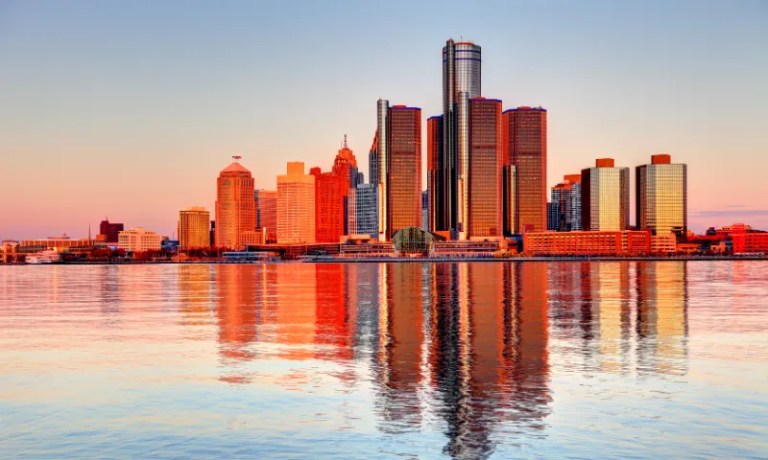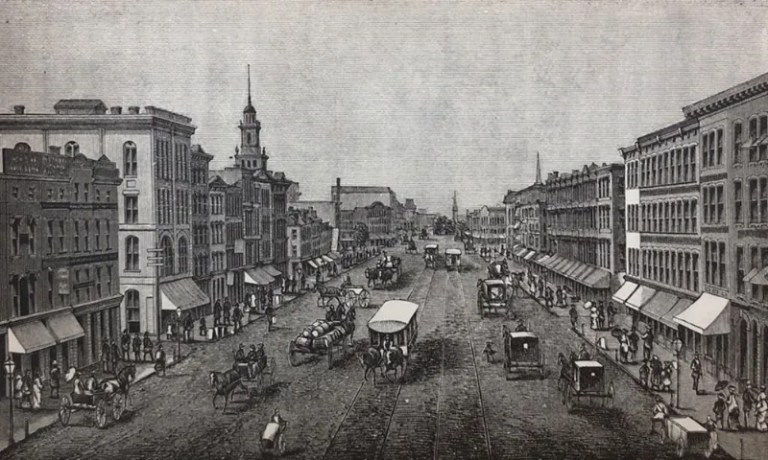The real cost of bottled water.
See how our bottleless water coolers compare.
Areas served
Offer a more sustainable solution for cleaner, better-tasting water on demand.
Fast, efficient, and reliable ice and water machines with advanced filtration.
Bottomless bubbles with built-in filtration for your modern workplace.
Better water makes better coffee. Give your people great-tasting coffee from best-in-class brewers.


Today, the Great Lakes Water Authority (GLWA) treats all Detroit drinking water and transports it to the city distribution system through more than 2,700 miles of water mains. The system sources water from intakes located in the Detroit River: one to the north, near the inlet of Lake St. Clair, and one to the south, near Lake Erie. The third intake is located in Lake Huron. Four plants treat source water drawn from the Detroit River intakes. The fifth water treatment plant, located in St. Clair County, uses source water drawn from Lake Huron.
Older cast iron pipes, like the ones originally installed, are susceptible to corrosion and biofilm contamination. To combat corrosion, treatment plants add orthophosphate, shown to prevent the leaching of lead into Detroit drinking water. Even with orthophosphate, chemical reactions can create clusters of pipe deterioration and bacteria along the inside of the pipe, resulting in “rotten egg” taste and smell.
Detroit has one of the nation’s strictest policies regarding lead and copper contamination. The recent Detroit Water Quality report shows that water leaving treatment plants does not contain lead, nor do the water mains. However, corrosion in service lines and household plumbing may still contaminate Detroit drinking water with elevated levels of lead.
Detroit was founded at the narrowest point of the Detroit River, an abundant source of clean drinking water. Early settlers relied on a rudimentary water distribution system delivering daily to residents by horse-drawn carts. As the city grew, residents began drilling wells to supplement river sources. But the wells came up dry, and later attempts to create reservoirs to capture surface water also failed. Detroit turned to the example of major metropolises of the east, like New York, Philadelphia, and Pittsburgh, by creating pumping systems to bring clean river water to their residents.
In the 1840s, residents often dumped waste in the river, compromising Detroit’s water quality and causing water-borne diseases like typhoid fever. Not until the early 1900s did Detroit city engineers recognize the link between wastewater and illnesses. In 1912, the U.S. Public Health Service issued a mandate that required Detroit to disinfect all distributed water with calcium hypochlorite.
In 1916, treatment switched to chlorine, a more effective disinfectant. Detroit also constructed a new water intake point well away from the city’s wastewater dumping area, especially critical as the automotive industry began its explosive growth. Detroit’s population boomed from the car industry, so quickly that city planners rushed to install cast iron mains without a coherent plan. Pipelines clustered on top of each other in some sections of the city, while other areas lacked any mains at all.
See how our bottleless water coolers compare.
Talk to an Detroit Culligan Quench water expert to find the best water solution for your space.
Backed by 85 years of Culligan expertise, Culligan Quench has focused exclusively on providing businesses with the highest quality filtered water. This commitment to doing one thing well has made us the trusted water authority for over 75% of the Fortune 500. We offer the best bottleless water coolers, ice machines, sparkling water dispensers, and coffee brewers to fit any workplace. No matter your location, company size, or industry, we have a filtered water solution that is right for you
Play videoProudly providing businesses with clean, filtered drinking water in the greater Detroit Metro Area.
| Mon: | 8 AM – 8PM |
| Tues: | 8 AM – 8PM |
| Wed: | 8 AM – 8PM |
| Thur: | 8 AM – 8PM |
| Fri: | 8 AM – 8PM |
| Sat: | Closed |
| Sun: | Closed |
According to local and federal sources, Detroit’s tap water meets or exceeds standards set by the Safe Drinking Water Act. That means tap water in Detroit is safe to drink. In late 2024, residents received notice that local service lines made of lead and galvanized materials are being replaced by 2034 to ensure continued quality and safety.
However, Detroit’s tap water has an average hardness level of 116 parts per million (ppm). While that’s technically safe to drink, the relatively high amount of minerals in Detroit’s tap water could affect the taste. It could also lead to issues around the home, including unsightly mineral buildup around taps and drains and inside appliances. A water cooler with advanced filtration can help improve your peace of mind and deliver better-tasting water.
Detroit gets most of its drinking water from the Detroit River. Additional water comes in from Lake Huron. All water sourced for drinking purposes undergoes treatment by the Great Lakes Water Authority (GLWA). After water is cleaned and tested at one of GLWA’s four plants, it’s sent to the Detroit Water and Sewerage Department (DWSD). The DSWD then funnels drinkable water to more than 200,000 residential and commercial accounts and around 680,000 citizens in the greater Detroit area.
Many buildings in Detroit were built before the 1950s and may still have lead service lines. Lead can leach into tap water, especially if it sits in pipes for several hours. While the Detroit Water and Sewerage Department (DWSD) treats water to minimize lead exposure, older service lines can still pose risks. Businesses concerned about lead can have their water tested and consider filtration systems like Culligan Quench bottleless water coolers.
Detroit’s water comes primarily from the Detroit River and Lake Huron. While treatment plants remove most contaminants, trace amounts of industrial chemicals, including PFAS (per- and polyfluoroalkyl substances), can be present in some areas. The city regularly monitors water quality and publishes annual reports. Using a certified filtration system can further reduce exposure.
Yes, Detroit tap water is treated to meet federal and state safety standards, even with historical industrial activity in the watershed. Treatment removes bacteria, heavy metals, and many chemical contaminants. Reviewing DWSD’s annual water quality report and testing water in older buildings is a good precaution.
Over 120,000 companies, big and small, trust Culligan Quench for cleaner, safer, and great-tasting water.
"Water is great
Ready to upgrade
your water?Get matched with the best water, ice, sparkling water or coffee machine for your workplace.
Take our quiz